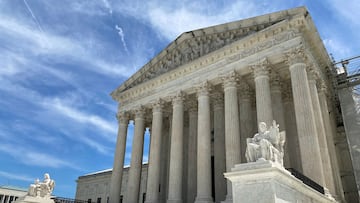What is the Chevron doctrine? Supreme Court decision will reduce regulatory power of federal agencies
The Supreme Court has ruled to overturn a 40-year-old decision that granted federal agencies extensive regulatory power. What is the Chevron doctrine?

The Supreme Court has voted to overturn a 40-year-old decision that has given administrative agencies extensive authority in interpreting laws, taking away their power to implement regulations unless Congress has directly spoken to the precise question at issue.
The decision is seen as a victory for conservatives, who have long contested the Chevron ruling and have tried to reverse it.
READ ALSO: How many Americans watched the presidential debate between Biden and Trump?
What do critics say about the Chevron decision?
Critics of the Chevon doctrine have argued that it gives too much power to administrative agencies, potentially leading to regulatory overreach, and that it diminishes judicial oversight of agency decisions.
They claim that due to the 1984 decision, federal agencies have had too much leeway in creating regulations that affect important aspects that have an impact on Americans, including the environment and health care.
READ ALSO: Fact check of the first debate between Trump and Biden
Supporters of Chevron decision say Supreme Court ruling could hurt Americans
Those who are against the latest Supreme Court decision say that overturning the Chevron ruling favors big business, and removes protections that federal agencies provide Americans. They say the High Court’s move endangers President Joe Biden’s environmental protection agenda and could jeopardize the government’s programs that affect the day-to-day lives of Americans, including those involving food and water safety.
Massachusetts Senator Elizabeth Warren said the Supreme Court ruling favors the powerful.
“Let’s call this Supreme Court ruling on Chevron what it is: a power grab by the far-right to benefit the wealthy and well-connected. Corporate interests want extremist judges to write the rules at the expense of consumers, workers, safety, and the environment,” she said on social media.
Supporters of the 40-year-old ruling argue that it respects the expertise of administrative agencies, promotes regulatory flexibility, and maintains a separation of powers by keeping courts from overstepping their bounds.
What is the Chevron doctrine?
The Chevron Doctrine is a cornerstone of the principle of judicial deference, where courts defer to the expertise and specialized knowledge of administrative agencies.
The principle emerged from and is named after the Supreme Court case Chevron U.S.A., Inc. v. Natural Resources Defense Council, Inc. (1984). The landmark ruling involved a challenge to a regulation enacted by the Environmental Protection Agency under the Clean Air Act.
The Chevron decision provides a framework for judicial review of federal administrative agencies’ interpretations of statutes that they administer. However, It gives agencies significant discretion in interpreting statutes and implementing regulations, allowing them to adapt to changing circumstances and technical complexities.






